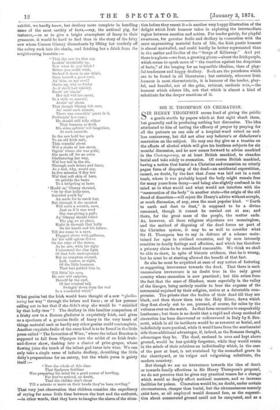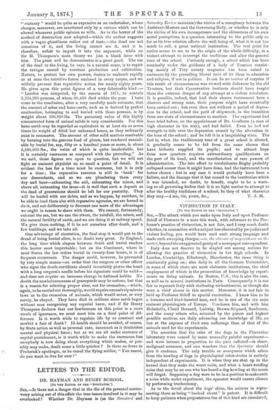SIR II. THOMPSON ON CREMATION.
SIR HENRY THOMPSON seems fond of giving the public a gentle startle by papers which at first sight shock them, but generally end in producing nothing but discussion. The idea attributed to him of testing the efficacy of prayer by praying for all the patients on one side of a hospital-ward raised an end- less controversy, but did not alter any believer's or disbeliever's conviction on the subject. He may one day give us a treatise on
the effects of alcohol which will give his brethren subjects for six months' discussion, and he now comes forward to advise mankind in the Contemporary, or at least British mankind, to abandon burial and take solely to cremation. Of course British mankind, having a notion that burial is a Christian and cremation an utterly pagan form of disposing of the dead—an accidental superstition, caused, no doubt, by the fact that Jesus was laid out in a rock tomb, where it was probably hoped the body might remain free for many years from decay—and being also slightly confused in its mind as to what would and what would not interfere with the "resurrection of the body" in another state—the origin of the old dread of dissection—will reject Sir Henry's advice without scruple, or much discussion, of any, even the most popular kind. "Earth to earth and dust to dust," is supposed to be a divine command, though it cannot be carried out at sea; and there, for the great mass of the people, the matter ends. As, however, all these religious objections are meaningless, and the method of disposing of the dead forms no part of the Christian system, it may be as well to consider what Sir H. Thompson has to say in defence of a scheme main- tained for ages in civilised countries, and by men intensely sensitive to family feelings and affection, and which has therefore a primary claim to be considered reasonable. We think we shall be able to show, in spite of historic evidence, that he is wrong, but he must be at starting allowed the benefit of that fact.
So also he must be acquitted at once of any notion of fostering or suggesting irreverence towards the dead. That there is such unconscious irreverence is no doubt true in the only great country where cremation is now practised ; but this arises from the fact that the mass of Hindoos, more especially in the valley of the Ganges, being entirely unable to bear the expense of the ceremonial enjoined by their religion, arrive at a detestable com- promise. The priests char the bodies of their dead till they are black, and then throw them into the Holy River, down which they float slowly out to sea, pursued, of course, for miles by the vultures ever on the watch. In that form cremation is unspeakably loathsome ; but there is no doubt that a rapid and cheap method of cineration has been discovered or rediscovered in Italy by S. Bru- netti, which in all its incidents would be as reverent as burial, and indefinitely more poetical, while it would have from the sentimental side these additional advantages, if, indeed, as the Romans thought, advantages they be. The dead, enclosed in urns and kept above ground, would be less quickly forgotten, while they would retain in the minds of their relatives an individuality which, in the case of the poor at least, is not sustained by the unmarked grave in the churchyard, or its vulgar and vulgarising substitute, the modern cemetery.
But though we see no irreverence towards the idea of death or towards family affections in Sir Henry Thompson's proposal, we do not perceive that he gives any practical reason for a change which would so deeply affect national manners, and so increase facilities for poison. Cineration would be;no doubt, under certain circumstances, cheaper than burial, but the circumstances scarcely exist here, as all employed would demand fees, as the supersti- tion about consecrated ground could not be conquered, and as a statuary" would be quite as expensive as an undertaker, whose charges, moreover, are sanctioned only by a custom which can be altered whenever public opinion so wills. As to the horror of the method of destruction now adopted—which the author suggests with a vague ghastliness rather out of taste,—the dead are not conscious of it, and the living cannot see it, and it is, therefore, unfair to import it into the argument, while on Sir H. Thompson's main theory we join a blank issue with him. The great evil he demonstrates is a great good. The use of the dead to the living, he says, in a natural sense, is to repair the ravages caused by constant production and cultivation. Nature, to protect her own powers, degree to reabsorb rapidly or at once the nutritive forces enclosed in every corpse, and we wilfully prevent that reparative action for nearly eighty years. He gives upon this point figures of a very debateable kind :— " London was computed, by the census of 1871, to contain 3,254,260 persons, of whom 80,430 died within the year. I have come to the conclusion, after a very carefully made estimate, that the amount of ashes and bone-earth, such as is derived by perfect combustion, belonging to and buried with those persons, is by weight about 206,820 lbs. The pecuniary value of this highly concentrated form of animal solids is very considerable. For this bone-earth may be regarded as equivalent to at least six or seven times its weight of dried but unburned bones, as they ordinarily exist in commerce. The amount of other solid matters resolvable by burning into the gaseous food of plants, but rendered unavail- able by burial for, say, fifty or a hundred years or more, is about 5,584,000 lbs., the value of which is quite incalculable, but it is certainly enormous as compared with the preceding." As we said, those figures are open to question, but we will not -fight an eminent physicist on so small a point of detail. It is evident the loss for a time must be enormous, but it is only for a time ; the reparative resource is still in ' bank ' for 'Our descendants, and as we are plundering them every day -and hour—exhausting the soil, exhausting the mines, and above all, exhausting the trees—it is well that such a deposit as the dead of generations should be left for our posterity. They will be loaded with our debts, and as we happen, by accident, to be able to load them also with reparative agencies, we are bound to do it, and not deliberately to discount one more of the advantages we ought in reason to share with them. We cannot, fortunately, exhaust the sea, but we can the rivers, the rainfall, the mines, and the natural fertility of earth, and we are doing it at railway speed. We give them nothing, if it be not ourselves after death, and a few buildings, and we take all.
One advantage of cineration, the final atop it would put to the dread of being buried alive, is no doubt very great. In England, the long time which elapses between death and burial renders this horror most improbable ; but on the Continent, where in most States the law orders burial in twenty-four 'hours, it is of frequent recurrence. The danger could, however, be prevented by very simple means—an order that the surgeon or other officer who signs the death-certificate should invariably pierce the heart with a long surgeon's needle before his signature could be valid— and does not require an immense change in national habits. No doubt the unwholesomeness of graveyards may be serious, but that is a reason for selecting proper sites, not for cremation,—which, again, to be carried out thoroughly, would require excessively minute laws as to the cremation of animals, which would never, or very rarely, be obeyed. They have died in millions since earth began without man recognising any especial harm, and if Sir Henry Thompson declares that our fearlessness on this point is a mere result of ignorance, we must meet him on a final point of dif- ference. Is it worth while to regulate life by so constant and morbid a fear of death ? Ill-health should be avoided, of course, by State action as well as personal care, inasmuch as it diminishes mental and physical force ; but as we are all under sentence of capital punishment, is it worth while to make the enormous fuss everybody is now doing about everything which makes, or pos- sibly may make, death come a little quicker ? Is there no force in Frederick's apothegm, as he caned the flying soldier, "You rascal, do you want to live for ever?"











































 Previous page
Previous page